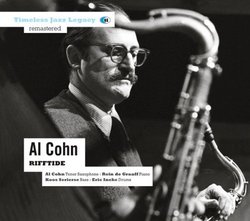High Tide: The Spirit of Coleman Hawkins Reborn.
Samuel Chell | Kenosha,, WI United States | 09/20/2007
(5 out of 5 stars)
"Listening recently to Mobley, Coltrane, Sims and Cohn on "Tenor Conclave" I was struck by the practically uniform level of the musicianship, apart from the later innovations of Coltrane. In hindsight it's the commitment to melodic invention and execution of the melodic idea that distinguishes the music of all four from anything you're likely to hear today. Cohn cut back on the taxing work of being the all-purpose arranger and orchestrator, devoting the last ten years or so of his life to the ephemeral but more personally fulfilling activity of creating beauty in the moment. One wishes Oliver Nelson had done the same, since even Cohn died prematurely, still playing with the best of them but, more importantly, allowing us to continue to hear his inimitable voice for as long as possible. Cohn was incapable of playing a bad solo, and anyone who has his definitive albums from the mid-50s will recognize the same player and be equally rewarded by this 1986 session. As T. S. Eliot insisted, the principle of improvement does not apply to the arts. As always, Cohn takes a simple little melodic riff and, before he's done with it, creates a tidal wave of the emotional energy that characterizes the best, least compromising, most direct and unvarnished jazz.
Don't worry about the unfamiliar Dutch rhythm section. They're fresh and state of the art, the pianist's post-Bill Evans voicing a nice complement to Al's more aggressive post-Coltrane approach. The bass is solid and clear without the over-boosted sonic mush that hampers so many of today's recordings; the drummer's ride cymbal is alive and sizzling. The music-making is strictly no-nonsense: no bass solos that overstay their welcome, no gratuitous brushwork finessing. These guys don't need to think "taste" because they play it: it's inherent within the structure of the material and their own melodic inventions on it. No breathy vibrato stuff from Al, romantic schmaltz, or even tender tones on the ballads. He plays full-barrel, full-throated sax at all times, simply burning his heart into every great tune, whether "Hot House" or "We'll Be Together Again." And of course, Cohn rides the fat part of the beat for every swinging measure.
Before I saw the name of the composer of the title tune, the player who kept coming to mind--the sound, the phrasing, the time-feel (i.e. relentless swinging)--was none other than the father of the tenor saxophone who, it turns out, composed "Rifftide." The Hawk, wherever he is, must love this one."

